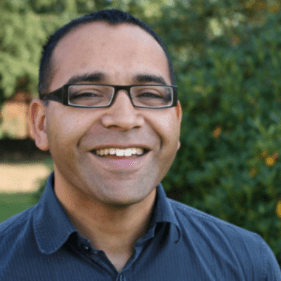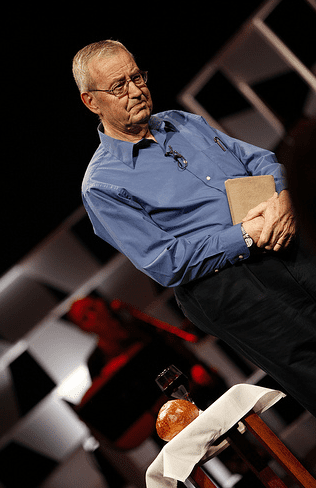I love Adam Hamilton’s book,  Why?: Making Sense of God’s Will, It is short. It’s wise.
Why?: Making Sense of God’s Will, It is short. It’s wise.
It asks four big questions: Why do the innocent suffer? Why do my prayers go unanswered?What can’t I see God’s will for my life? Why God’s love prevails?
But this isn’t a book that gives all the traditional answers; in many ways it’s a deeper apologetic than “answers to tough questions.” Adam is a pastor’s pastor and out of his years of experience Church of the Resurrection (UMC) in Kansas City he turns his attention to questions that each of us will ask at some point in life.
So, why do the innocent suffer?
Disasters force this question. Tragedy forces this question. The question arises from a conviction of how the world is supposed to work. God does not meet our expectations. But the Bible does not teach that God’s people will live in bliss, and God’s own Man died on a cross. God did not make a world in which we live absent of suffering.
Nor, Adam counsels, does the Bible teach us that everything happens for a reason. Too easily this idea unconsciously slides into God being the cause of tragedies and suffering. Is rape or murder the will of God?
Adam proposes three ideas:
1. God has placed humans in charge of earth (Gen 1:27-28). Much to be said here, and he sketches some biblical theology on this one. “God’s primary way of ruling and acting on our planet is through people” (12).
2. To be human is to be free. We are called to choose between what is right and good and what is wrong.
3. Humans have a disposition to stray from God’s path. Sin and sin nature.
Leading now to three categories of suffering
1. Natural disaster and widespread human suffering. God made a world where these things happen; we might push this argument back into that kind of theodicy, but Adam argues we don’t have to think of earthquakes as caused by God. Humans are to respond to such disasters with compassion.
This all leads to a question like this: Is it more reasonable/biblical/theological to you to believe in divine causation for natural disasters or to see them more indirectly connected to God through the kind of world, where there is some freedom and chaos, God chose to make?
2. Suffering caused by human decisions: this one is plain to see. What we do, what others do … can cause suffering. Is this God? Or is this human decision?
3. Suffering caused by sickness: our bodies are not indestructible, and there’s an element of freedom about it … and we mostly live until a ripe old age — if we are in the affluent world … and is each and every sickness the result of divine causation or the way God made us?
In chp 2 he asks about unanswered prayer — and wonder why (as some think) God answers prayers for parking lots and touchdown passes but not for those who have cancer or those whose unborn children will die?
How do you approach unanswered prayers? How do pastors out there explain these issues?
He begins with Jesus. A website observes that there are reasons why our prayers are not answered, one of which is sin — Adam: “Jesus heals because he is holy, not because those he heals are holy” (35). We need to be careful about this “reason” for unanswered prayer. Maybe we don’t know what Jesus meant when he said faith could move a mountain. We are to understand this hyperbolically but not hyper-literally. Then he drives this point to exaggeration: if this statement by Jesus is 100% literal, we wouldn’t have to do anything. We could just pray.
Two NT unanswered prayers. 2 Cor 12:7-10.
7 or because of these surpassingly great revelations. Therefore, in order to keep me from becoming conceited, I was given a thorn in my flesh, a messenger of Satan, to torment me. 8 Three times I pleaded with the Lord to take it away from me. 9 But he said to me, “My grace is sufficient for you, for my power is made perfect in weakness.” Therefore I will boast all the more gladly about my weaknesses, so that Christ’s power may rest on me. 10 That is why, for Christ’s sake, I delight in weaknesses, in insults, in hardships, in persecutions, in difficulties. For when I am weak, then I am strong.
And what of Jesus’ prayer in the Garden, that the cup would pass from him? Did God “answer” that prayer? God does not always answer our prayers as we want; but God does not abandon us; and God works through that situation (you wanted to happen but God didn’t answer your prayer).
How does God answer prayers? Normally through ordinary means. God does not suspend the free will of another to answer my prayers. God will be with us through our prayers.
The number of times I’ve had students bring this topic up with me is beyond my memory, but it’s common enough. What Hamilton writes in this chp is more or less what I’ve said, but the images he uses will become my standard ones.
What about you: Is God’s will for your life predetermined? a script? or do we collaborate with God as God reveals a prescriptive will?
“All the world’s a stage, and all the men and women are merely players…” (Shakespeare, As You Like It).
Adam begins with a view of God’s will that is nothing short of the strong Calvinist view: predeterminism. Your life has been scripted by God. It’s a form of determinism. Adam critiques this view: God ultimately becomes responsible for the world’s evil. [I have never been convinced that Calvinism can escape this accusation.] We become robots which God stages for his own enjoyment. But this mocks the justifiability of judgment — how or why judge what God himself already determined? These are the standard criticisms, and I summarize what Adam has said.
Another view is that God has a script for us — a specific script — but he gives us freedom to do what he wants or not do what he wants. While his view is not that far from this view, this specific script creates a problem if we stray from it significantly one time? Does God then re-script us? Or, or …? Why doesn’t God just tell us what he wants specifically?
This leads Adam to the view he defends: God has a prescriptive will — Ten commandments, the Jesus Creed, etc — and each day we discern by listening to God and paying attention to life how to live out that prescriptive will.
“I believe God’s plan for our lives is not so much a manuscript already completed, but an idea and outline for a story that God hopes we will choose to follow, filling in the outline with God each day” (62). When we invited God in or listen to God our story can become redemptive.
His image: Parents. Kris and I both had big ideas for our kids, but we never really determined in advance what kind of life they would choose. (Other than being Cubs fans, I jest.) It is more about how and why we make decisions than the specific decisions we make.
As we listen to God in life we see not “coincidence” but “God-incidents.”
How have you helped people live through difficulties? What themes have been wise and redemptive?
First, God is with us. We fear. Sometimes something happens and the note of fear strikes into the fiber of who we are and what we think — we fear the worst. But God is with us. E.g., Josh 1:9; Isa 41:10; Ps 23:4; 56:3. We may fear what may happen to our children or someone we love, and we can’t know that all things will be good, but we can know that God is with us and with them.
Second, God works through us. God made a world in which he gives us the opportunity to act redemptively in this world. Wow, he’s got a great story about helping a woman.
Third, God forces evil and suffering to serve us. Sometimes we suffer; sometimes those we love suffer; sometimes those we don’t love suffer. But the promise is that God “forces evil and suffering to serve God” (87-88). His two best friends died, and he tells the story of Emmitt Till, who was brutally murdered and whose murder became a powerful source of change.
Finally, ultimately hardship an suffering, evil and sin, will not have the final word. Following Good Friday is Easter. I hadn’t seen this from Frederick Buechner: “Resurrection means the worst thing is never the last thing” (98). God will ultimately triumph.










